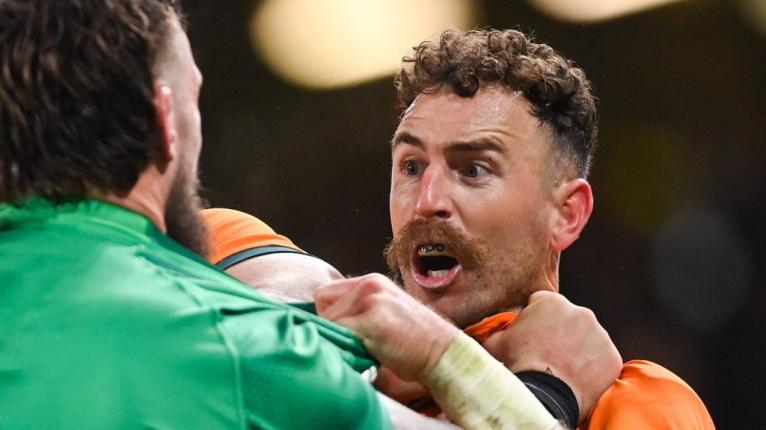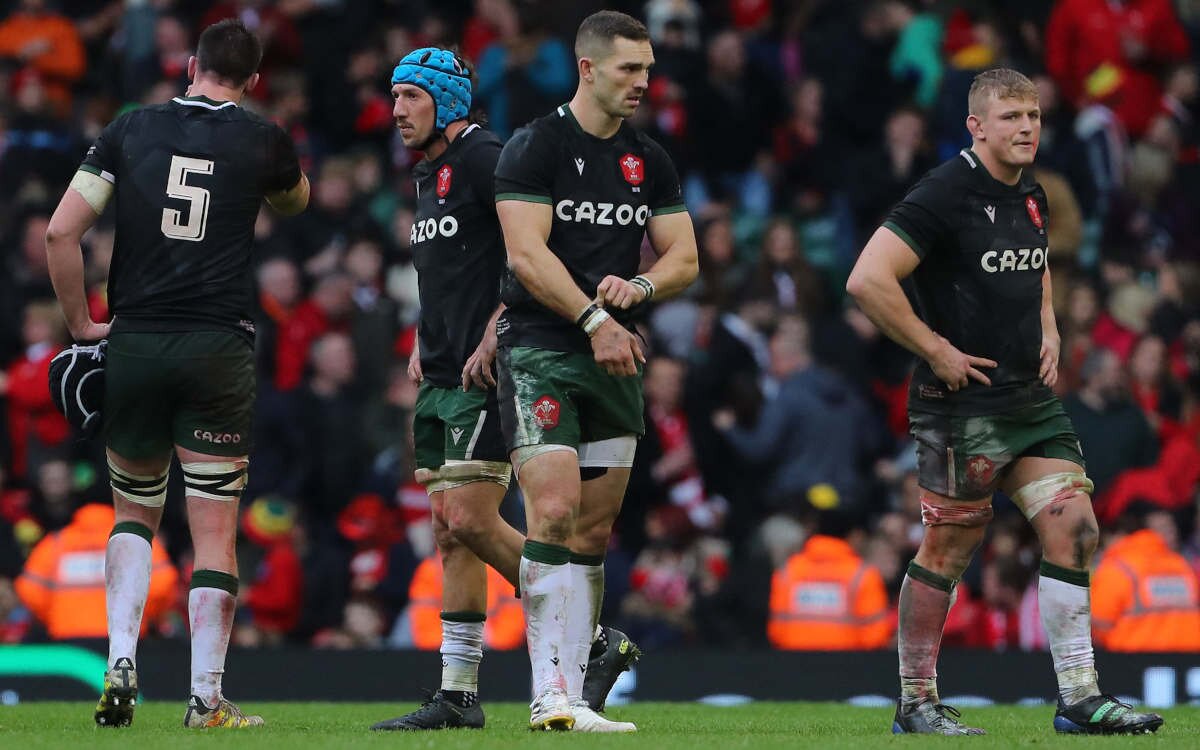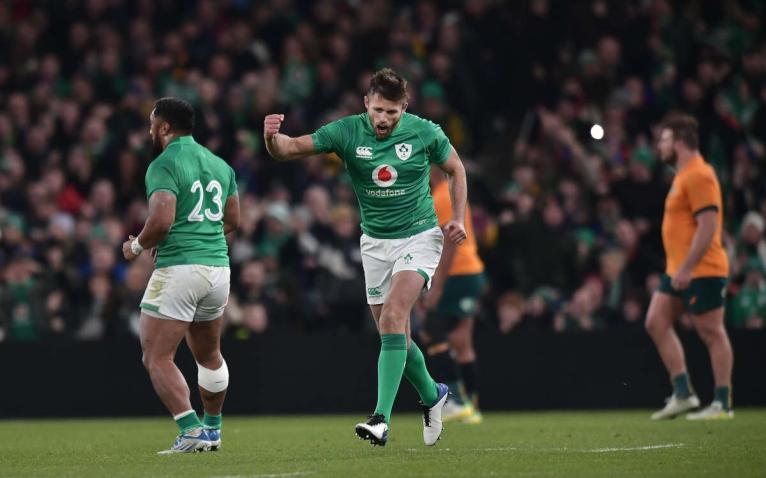It’s been quite a weekend of rugby. England staged the mother of all comebacks against a shellshocked All Blacks side, who had thoroughly deserved their 19-point lead. In Dublin, the Wallabies yet again went down to a narrow loss over Ireland, while Scotland and Argentine indulged in some argy-bargy before Finn Russell safely carried them to a handsome win, all while a re-energised Springboks cut loose over an improving Italy side. As for Wales, they left with Georgia on their mind and in their nightmares. In short, we were spoilt and there’s still a weekend left of top-class rugby…
England nick a draw after being outplayed
Why does sport do this to us? Why does it play with our emotions and fool us to think we know what the eventual outcome is going to be? At 71 minutes, England were buried. Down and out. Trailing 25-6 to a well-0rganised All Blacks side and clearly second best.
Ian Foster’s men had outscrummed them, out mauled them and outran them with three tries to zip. Indeed, Rieko Ioane’s sumptuous effort – their third – seemed to underline their superiority. A cute 25m kick-pass from Beauden Barrett was caught by Caleb Clarke, who swivelled, and switched the ball to Ioane who stretched his long legs for a 70m run in down the left hand touchline. It was a delightful score. Indeed, when Jordie Barrett, clipped over a drop-goal, their lead looked unassailable. Then England woke up, and it was typified by Marcus Smith who scampered towards the All Blacks tryline and Will Stewart, after much deliberation from Matthieu Raynal, he was awarded the try, 25-12. Beauden Barrett saw yellow and expectation started crackling in the cool South-West London breeze. Twickenham came alive, and from the kick-off, they were able to engineer another attacking opportunity, and on 74 minutes, Will Stewart plopped over for his unlikely try-brace.
Suddenly, from being on the canvas, England were within a converted score, as the partisan crowd started sensing the unexpected.
As the All Blacks tried to close out the game, with the clock creeping past 78 minutes, England regained possession and got round the edge, with a balletic offload from David Ribbans, to work Freddie Steward into space, where the Leicester Tiger had the legs to go over to wild abandon in the stands. With Smith adding the conversion, there was still time for a grandstand finish but deep in his own half, the Harlequin decided to end the excitement and hoof the ball into the stand, much to frustration of crowd. As Ian Foster admitted later on, the All Blacks gave themselves an uppercut with their inability to close the game out. Foster, who had been hours from the heave-ho in the summer, was understandably flat that a six-match winning run had come to an end. Eddie Jones, as you would expect, felt that a result was still on, but you sense that privately he will know he had an almighty escape. A hum-drum season 2022 will come to an end against the Springboks and Jones will know he has used his get-out-of-jail for free card. The Great Escape had been achieved.
Rugby needs to get a grip on concussion
In 2013, when a reeling George Smith was led stumbling from the pitch in the third Test of the Lions series, after a head clash with Richard Hibbard, only to be sent back on minutes later, rugby finally sat up and took notice of concussion. Or at least, it was forced to. This kind of abomination would no longer happen, we were told. Protocols would be more robust, awareness raised, culture changed.
So in November 2022, for those who watched Smith’s zombie-like departure, the sight of Nic White staggering around the Aviva paddock and being allowed to play on was a horrible window into a grim time for player welfare.
Two stupefied Wallabies, almost a decade apart. The same desperate problem.
Brain injury is the single biggest issue facing rugby right now. It’s a rapidly spreading crisis, threatening to envelop the game. Truly and unavoidably existential.
The rules are simple: any symptom of concussion – including a loss of balance – and the player is removed permanently. No head injury assessment, no opportunity to rejoin the fray. No arguments. Nobody who watched White teetering, a glassy look in his eyes, can make a legitimate case for his return to play.
Rugby has come a long way since Smith and the Lions. The head injury assessment is a good tool, but it is not flawless. Independent doctors with access to myriad footage are standard practise, yet sometimes that footage is not forthcoming.
Much has changed, and yet these sickening incidents continue. A few hours before White’s glazed lurching, Juan Cruz Mallia appeared to be knocked unconscious in the final moments of Argentina’s loss at Murrayfield. “He’s out, he’s out”, was heard over the referee’s microphone. Mallia sat up with the air of a man wondering whether he was at Murrayfield or Mendoza. The Argentina medic spent a total of twelve seconds on the pitch and about eight with the stricken full-back.
This was the 82nd minute and Argentina were trailing by thirty points. You can understand, but not excuse, the desire to keep top players on the park when games hang in the balance. But even by that misguided competitive thinking, where was the sense in leaving Mallia on the pitch and his health at risk? Utterly brainless, if you’ll pardon the pun.

Here’s the thing about head trauma: everyone reacts to it differently. Symptoms can take hours to arise. People present in different ways and recover at different rates. The head injury assessment cannot catch every concussion, so it is incumbent upon rugby people to act with caution. Why take a chance with a person’s brain? In the cases of White and Mallia, the protocols indicate both should have been removed permanently. Following a post-match review, White will now serve a twelve-day stand-down.
Rugby is already battling a PR problem, lawsuits, and an explosion of former players suffering from the most awful neurodegenerative conditions. These men are the first, but they will not be the last. The list is growing.
A parent who saw White in Dublin or Mallia in Edinburgh might think twice about letting their child take up the sport. A casual observer might be put off watching rugby again.
We, as regular spectators, are far more cognisant of concussion and far quicker to notice players in trouble and that is a good thing. The players themselves have a greater understanding of what might happen should they soldier on through a blow to the head.
But we are entitled to ask why this is still happening. Why White and Mallia were kept in the line of fire. Why Jeremy Loughman was not removed on Ireland’s July tour of New Zealand. Why Tomas Francis remained on the pitch during Wales’ Six Nations loss to France. Four high-profile incidents in eight months. Answers are needed. World Rugby must find them. The sport depends on it.
Wales meander listlessly towards mediocrity
For rugby-mad countries such as New Zealand, South Africa and Wales, a distressing loss can deflate the national psyche, and throw it into the pits of despair.
Sadly for Wales, they cannot be grouped with two sides who have lifted the World Cup on six occasions. They face disappointment far more regularly but 2022 has tested the patience of the most sanguine Welsh fan.
A larruping by Ireland in Dublin was hideous with only the gritty win over Scotland to show from a hugely disappointing Six Nations, which ended with an ignominious first-ever home loss to Italy. Wales came away with credit from their South African tour, going close in the first Test and winning the second – albeit against a heavily understrength Bok side – but their soft underbelly was exposed against the All Blacks earlier this month, who put 55 points on Wayne Pivac’s men in a deeply worrying performance. As they have done too many times, they rallied against Argentina, but the 13-12 loss to Georgia was a new low. Wales were utterly woeful.

Granted, two tries, from Josh Adams and Jac Morgan, were chalked off for a forward pass and a knock on, but they did not score a point after the 24th minute. Their scrum was dismantled and finished with Sam Wainwright, Bradley Roberts and Rhodri Jones, who were sent backwards at a rate of knots. You felt sorry for Dafydd Jenkins, the 19-year-old Exeter Chief making his debut appearance, and wonder if he should have been thrust into such a tense game. In the backline, there was no semblance of attacking verve or brio. It was flat, disorganised and lacking in purpose. It was, quite frankly, dreadful. Georgia weren’t even at full strength, missing eight players, fielding a 19-year-old tight-head, but they were still worthy winners.
So where does this leave Wales? The search for a new head coach should have started but such is the state of disharmony in the game, that nothing can be taken for granted.
Pivac can cite the disfunction that sees the amateur club game able to play kingmaker to a near £100m company, and lament the fact the regions are neutered and drifting listlessly into mediocrity. Maybe results have to sink this low for effective change to be forced, but for all the mitigating circumstances, Wales should be better than the effort they showed on Saturday. Much better.
A win over a patched-up Australia may paper over the cracks, but signs of progress are sorely lacking, and if this malaise is to continue, crowds will start to wane and the WRU coffers will be hit. It’s a slippery slope. S
omeone at the WRU needs to stand up and show decisive leadership.
Byrne baby Byrne
In life, everyone has a choice. Good guys can become bad guys; reality TV stars can get a proper job; forgotten rugby players can become sour. Alternatively, they can accept a late call up to an Irish squad that appeared to be part of their past and decide they want to become Johnny Sexton. You just have to believe in your own storyline.
The Ross Byrne story began in the second week of December, 2016. Sexton had gone down injured, so too Cathal Marsh. Leinster head coach Leo Cullen checks his spreadsheet and remembers he has only one fit out-half registered with the EPCR. He turns to his fourth-choice ten, scribbles his name on a form and sends it away to the offices in Geneva.
In all the previews to Leinster’s game against Northampton that week, Ross Byrne is barely a footnote, filed away under the section: in other news. Sixteen minutes in, Joey Carbery goes off with an ankle injury, and the player whose name was prefixed ‘medical swap’ is introduced for his European debut. Almost straight away, he fires a crossfield kick for Rory O’Loughlin to score. Leinster win 37-18 in Franklin’s Gardens.
It isn’t the last time he nails a clutch click. Despite living in Johnny Sexton’s shadow, Byrne has actually played twice as often for his province as his mentor and rival. “He’s had over 100 Leinster caps,” says his former Leinster colleague, Darragh Fanning. “You can’t be lucky over 100 times.”
In fact he has been unlucky. In 2018, Ireland brought 32 players on tour to Australia. Thirty one played. You don’t need to be told who the odd man out was.
His first two starts for Ireland were both at Twickenham and each time Ireland lost, 57-15 in 2019; 18-7 a year later. That seemed to be his international obituary.

But no.
Last Tuesday he wasn’t even in the Ireland squad but an injury to Joey Carbery saw him get a call-up. Prior to then he’d seen Connacht’s Jack Carty, his younger brother, Harry, his Leinster colleague, Ciaran Frawley, and Ulster’s Billy Burns get chances ahead of him.
He waited patiently. Would he get another shot at this? Just before 10pm on Saturday the answer came. Ben O’Keeffe, the match day referee, awarded a late penalty. If Byrne could nail it, Ireland would complete the set, the first team to beat all three southern hemisphere giants in a calendar year since 2016.
But there was a problem, wasn’t there? Ross Byrne only found out he was in the match day 23 about 25 minutes prior to kick off. Surely he couldn’t go from such a state of unpreparedness to being a matchwinner?
And then we thought back to another kick, from a similar distance, again in the Aviva Stadium, against Ulster in the 2019 Heineken Cup quarter-final.
He’d actually been treated for an injury just after the penalty was awarded in that Heineken Cup game. Ulster had rattled Leinster that day. A surprise win was on the cards. Byrne was hurt – physically and possibly emotionally from his summer tour rejection. But he landed the winning penalty. Three years on, the same stadium, a similar scenario, a different jersey. Can the reject become a hero? By now you know the answer. Those who knew Ross Byrne’s mentality knew the answer before the ball was even kicked.
Two of the best snubbed
We all know by now that taking World Rugby’s annual awards do too seriously is a fool’s errand. Normally, you can make a convincing case for about half a dozen men who should be on the player of the year shortlist. Picking a final four involves a few coin-flip decisions.
But cast your eye over the men’s team of the year selection, and there are some staggering omissions. Eben Etzebeth doesn’t get in. As totemic a presence as Sam Whitelock remains in the All Blacks engine room, Etzebeth has been better, and more consistent. His relentless, snarling excellence a staple in a fluctuating Springbok team.
Ardie Savea has been hard done by, too. The beating heart of New Zealand. A man who makes yards when most make inches. Just as immense with a seven or an eight on his back. There should be a place for him in the back-row of Pablo Matera, Josh van der Flier and Gregory Alldritt, probably at the expense of the Argentine.
It’s all a bit of fun, at the end of the day, but it is a prestigious honour nonetheless. Etzebeth and Savea are entitled to feel aggrieved.
Case for the defence
Simon Easterby is not Paul O’Connell. He doesn’t have the CV of Mike Catt. He is understated and quiet, media-shy. He is also the best departmental coach Ireland have at the moment.
While much of the focus has been on Ireland’s attack, which has been too hot for the All Blacks to handle, it is on the other side of the ball that Ireland have made serious progress. On Saturday they had to defend inside their 22 for huge chunks of the first half, at one stage surviving 21 phases without the ball.
But they did survive. They made 203 tackles to Australia’s 122 in the match; secured only 44 per cent possession in the game, and yet they still contained the Wallabies to just 10 points, their second lowest total in 21 games. If Ireland are to do something in next year’s World Cup – and it remains a big if – this is the area that’ll result in them making progress.




As regards head injuries and concussion, why are Head Protectors not mandatory, certainly in the professional game? Surely they offer a good level of protection from serious and damaging hear injuries. My 16 year old Grandson is a very keen player, plays on the Wing for KGS but always wears his Head Protector voluntarily.